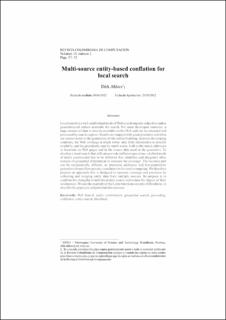| dc.contributor.author | Ahlers, Dirk | |
| dc.date.accessioned | 2023-11-20T09:06:00Z | |
| dc.date.available | 2023-11-20T09:06:00Z | |
| dc.date.created | 2014-11-27T16:31:46Z | |
| dc.date.issued | 2012 | |
| dc.identifier.citation | Revista Colombiana de Computación - RCC. 2012, 13 (2), 37-52. | en_US |
| dc.identifier.issn | 1657-2831 | |
| dc.identifier.uri | https://hdl.handle.net/11250/3103475 | |
| dc.description.abstract | Local search is a well-established mode of Web search engines today. For most developed countries, a huge amount of data is directly available on the Web and can be extracted and processed by search engines. In many developing countries, the Web coverage is much lower and only little information is directly available. To develop a Local Search that still can provide sufficient coverage, a hybrid mode of index construction has to be followed that identifies and integrates other sources of geospatial information to increase the coverage. The location part can be exceptionally difficult, as imprecise addresses and low-coverage geocoders do not allow precise coordinates to be used in mapping. We present an approach that is designed to increase coverage and precision. We use the example of Honduras, a country in Latin American, to describe the approach and potential data sources. | en_US |
| dc.language.iso | eng | en_US |
| dc.publisher | IEEE | en_US |
| dc.relation.uri | http://revistas.unab.edu.co/index.php?journal=rcc&page=article&op=viewArticle&path[]=2124 | |
| dc.title | Multi-source entity-based conflation for local search | en_US |
| dc.title.alternative | Multi-source entity-based conflation for local search | en_US |
| dc.type | Peer reviewed | en_US |
| dc.type | Journal article | en_US |
| dc.description.version | acceptedVersion | en_US |
| dc.source.pagenumber | 37-52 | en_US |
| dc.source.volume | 13 | en_US |
| dc.source.journal | Revista Colombiana de Computación - RCC | en_US |
| dc.source.issue | 2 | en_US |
| dc.identifier.doi | 10.1109/la-web.2012.21 | |
| dc.identifier.cristin | 1178016 | |
| cristin.ispublished | true | |
| cristin.fulltext | original | |
| cristin.qualitycode | 1 | |
